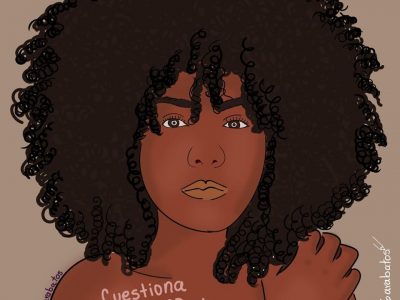
“I <3 My Jungle.” Image shared on Panamanian social networks as a response to Rita García's online comment.
Immigration in Panama is a hot topic, and social networks are stoking the fire. Small acts online have a tendency to affect people's lives in big ways.
Most recently, Panamanian lawmaker Zulay Rodriguez attracted the scorn of Internet users abroad with a speech in parliament where she used the word “scum” to describe Colombian citizens captured in Panama, blaming foreigners for various crimes throughout the country, and advocating an end to the state's Crisol de razas (melting pot) program, which seeks to facilitate the naturalization of thousands of undocumented immigrants.
The Colombian Foreign Ministry and the Panamanian press also condemned the speech. Rodriguez later apologized for her words, but Internet users have continued to debate her remarks. Not surprisingly, Panamas's immigrants have been especially aggressive about responding.
Venezuelan immigrant Rita García answered Rodriguez's speech with a controversial tirade against Panamanians, comparing them to “monkeys” and saying they're incapable of respecting foreign cultures. After a massive backlash, García deleted her inflammatory post, but not before it had been shared widely across the Internet. Outraged Internet users responded with a petition on Change.org calling for her deportation, quickly collecting more than 17,000 signatures. Panama's immigration officials later contacted García, but she and her husband had already lost their jobs and left the country.
On Pin Radio, Alejandra Farías, another immigrant from Venezuela, wrote an article titled This Is Why Venezuelans Are Thrown Out, where she expressed her outrage and argued that García's case should be a lesson to other Venezuelan immigrants to Panama:
¿Quién se cree Rita García de Zedde para ofender y no recibir ningún escarmiento?. Yo estoy a favor de su deportación. ¿Cuántos venezolanos no quisieran tener ahorita, el empleo en el banco Panameño que tenía Rita?. ¿Cuántos venezolanos viven meses separados de sus familias tratando establecerse para trasladar a esposa e hijos con alguna comodidad? ¿Cuántos Venezolanos exiliados salen todos los días a “patear calle” a ofrecer sus productos, mostrar sus negocios o a repartir hojas de vida?
Who thinks Rita García can offend others without being punished? I'm in favor of her deportation. How many Venezuelans right now would not want to have the job that Rita had at the Panamanian bank? How many Venezuelans spend months separated from their families, trying to settle down, so that they can send for their wife and kids to immigrate comfortably? How many Venezuelan exiles go out every day to “walk the streets” to offer their products, display their businesses, or hand out resumes?
The online response wasn't all attacks, though. There were also shows of appreciation for immigrants from Panamanians like Shaila Valdez, who shared several words of welcome in on Facebook:
I love my Colombian who manicures my nails perfectly, and does my hair removal divinely. I love the one who tends to me in a restaurant and says “good morning,” “one moment,” and “come back soon” to me!!!
I love my Dominican who gives me a beautiful blow out, and plays her beloved bachata for me, while she shows me photos on her cell phone of the children she left behind in the Dominican Republic.
I love the Chinese man who stands at the corner of my block and greets me with a “WHAT'S UP” and the woman with a “HOW ARE YOU, GIRL?”
I love the Italian who makes oven-baked pizzas and while I wait tells me that the man who founded the pizzeria many years ago was his grandfather.
I love the German who brings me beer and apple shots, while he teaches me to say “good morning” and “thank you very much” in German, while we celebrate Oktoberfest…
I love the immigrant who comes here to make my Panama bigger and more productive, who comes here to move forward humbly… I love them because I want people in other countries to love my people when they arrive in search of a better future.
Panama, the bridge of the world and the heart of the universe.
Migration in Latin America is a complicated process, of course, and the incident with Zulay Rodriguez and Rita García show how the Internet can amplify ill will, just as it can bridge divides between people. It's up to individuals which kind of social media they'd rather have.






